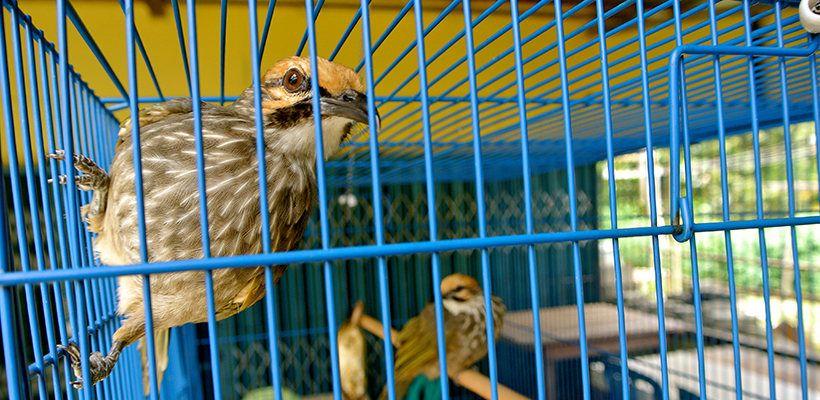Straw-headed Bulbul populations are being driven to critically low levels by trapping for the Indonesian songbird trade, according to a new study.
The new paper, published in Bird Conservation International, shows that the species remains very much in demand for the songbird trade, and its beautiful, melodious song may well prove its downfall in the wild.
Market inventories in Kalimantan and Java between July 2014 and June 2015 recorded a total of 71 individuals in 11 markets in eight cities; this included five birds that were kept as pets and were not for sale. Comparing this against historical literature, researchers found that as numbers in markets decreased, prices soared to over 20 times those recorded in 1987. This availability-to-price relationship suggests that the inflation in prices is linked directly to the rarity of the birds in the wild.
Straw-headed Bulbul's IUCN Red List conservation status was revised from Vulnerable to Endangered in 2015, but the authors believe that a Critically Endangered status more accurately reflects the situation.

Captive Straw-headed Bulbuls ready for sale (D Bergin/TRAFFIC).
"Just 71 animals over a year seems miniscule when compared to tens of thousands of birds traded in the Indonesian market. However, each animal taken is one too many for a rare species that has disappeared from most of its original range, and whose survival is now hanging by a thread," said Kanitha Krishnasamy, Acting Regional Director of TRAFFIC for South-East Asia.
The species has most likely vanished from Myanmar, Thailand and Java, but small pockets remain in Sumatra, where there has been only one recent reported sighting since 2009. Populations in Borneo and Peninsular Malaysia have also greatly declined.
While most of the birds observed were said to be sourced from within Indonesia (Kalimantan and Sumatra), traders also openly admitted to importing birds from neighbouring countries. Although the species has been listed on CITES Appendix II since 1997, no imports into Indonesia have been reported since 1999. This indicates that if birds were imported, they were done so illegally.
"Straw-headed Bulbul is currently not listed on the protected species list in Indonesia, one of the countries where it is most heavily traded," said Serene Chng, co-author of the paper and TRAFFIC's Programme Officer in South-East Asia. "According it protected species status in the new national wildlife legislation could enable stronger action against traders illegally selling this species."
Although some of the birds are said to be captive-bred or ranched, traders indicated that wild-caught individuals were considered superior because of their song quality. There was therefore an incentive to stock wild-caught birds over captive-bred individuals if traders could acquire them.
The paper also recommends listing the species on CITES Appendix I to further protect it from illegal international trade. Straw-headed Bulbul is one of the 28 priority species identified as being most threatened in the Conservation Strategy for South-east Asian Songbirds in Trade, and the demands in this new paper mirror those outlined in the strategy.


